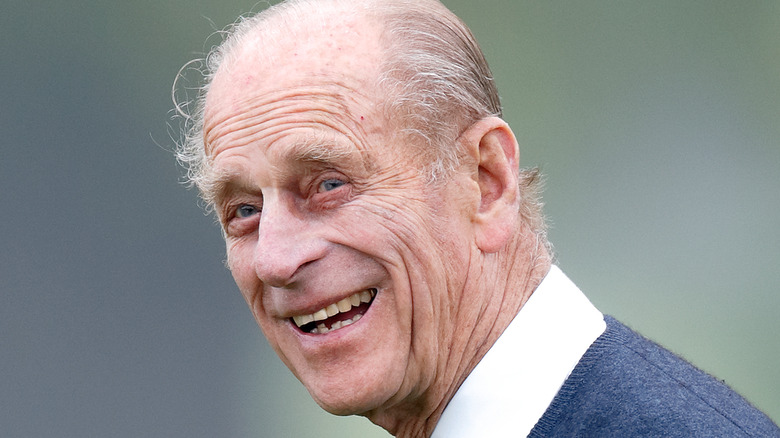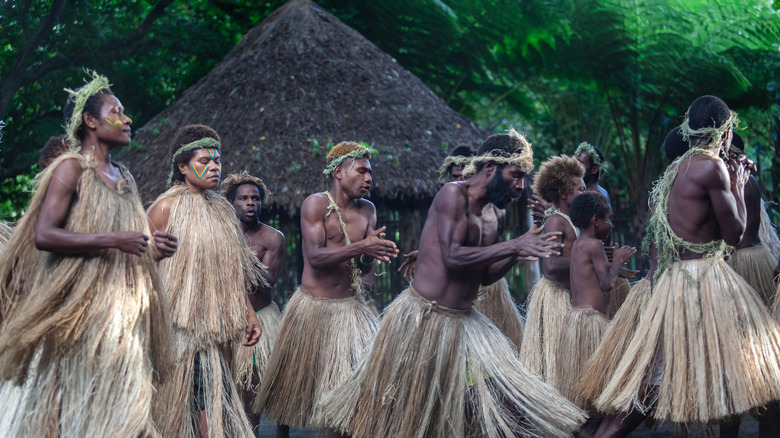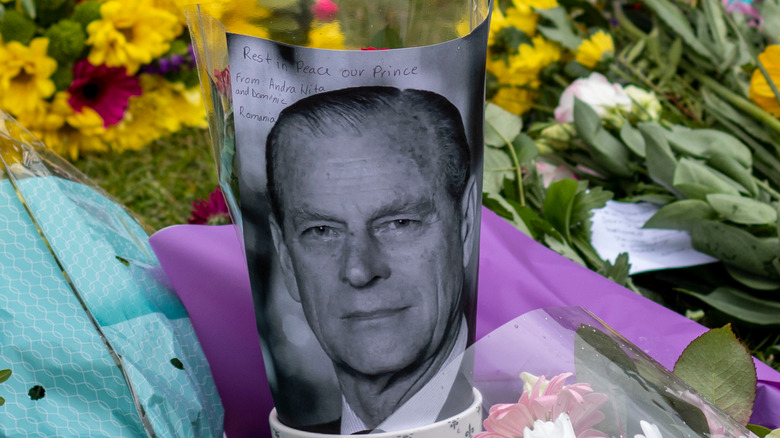The Real Reason This South Pacific Tribe Worships Prince Philip
Prince Philip, Duke of Edinburgh, was a pretty big deal in his nearly 100 years of life on Earth. Married to the Queen of England and siring future heirs to the crown, Philip was revered as a member of the monarchy, a member of the royal navy, and an avid sportsman.
But Prince Philip is an even bigger deal to the tribespeople on the island of Tanna in the South Pacific nation of Vanuatu, where the inhabitants believe the late prince is a "recycled descendant of a very powerful spirit or god that lives on one of their mountains," according to what anthropologist Kirk Huffman told the BBC.
While the origins of the villagers' worship of Prince Philip are unclear, according to The Guardian, the islanders' believed as part of their ancestral lore that a pale-skinned son of a mountain spirit would travel to a far away land and marry a powerful woman, then he would come back. When Prince Philip and Queen Elizabeth visited Vanuatu in 1974, it helped confirm the tribespeoples' beliefs.
The Tanna people hoped Prince Philip's spirit would be a messenger of peace
In a translated transcript of the documentary "Waiting for Philip," posted on the website Journeyman, Tanna Chief Siko Nathuan told an interviewer, "Prince Philip, who you're asking me about, he emerged from here. He is the Garden. He is the Spirit who comes out from here and becomes the Garden."
Anthropologist Kirk Huffman said in the film, "From their point of view, he's not a part of our world, a white man's world. He's a part of their world. That's the way it needs to be seen."
The way the BBC explains it is that the people of Tanna believe Prince Philip's spirit originated on their island, and that spirit's mission was to go out into the world and sow peace and a respect for customs, or what the Tanna call "kastom." Huffman told the BBC that the mission of the prince had been corrupted, though. Huffman said, "Ruling the UK with the help of the Queen, he was trying to bring peace and respect for tradition to England and other parts of the world. If he was successful, then he could return to Tanna — though one thing preventing him was, as they saw it, white people's stupidity, jealousy, greed and perpetual fighting."
Possibly, the Tanna villagers' ideas stemmed from the 30 years that Christian missionaries inhabited Tanna, forbidding their customs and rituals and trying to enforce Christian ideals, then punishing them to hard labor when they didn't comply, per the Smithsonian.
The villagers also deified another white foreigner
The worship of Prince Philip as a savior of sorts could also be related to the villagers deification of an American they call Johh Frum, a man who may or may not have really existed, but who the Tanna people regard as not only saving them from the missionaries, but as someone who is going to return with cargo, which the Smithsonian describes as a kind of "cargo cult," a phenomenon that stemmed from the World War II era. Huffman told Smithsonian, "You get cargo cults when the outside world, with all its material wealth, suddenly descends on remote, indigenous tribes."
Those encounters impressed the tribespeople, because the foreigners had so much bounty. One villager told Smithsonian, "John promised he'll bring planeloads and shiploads of cargo to us from America if we pray to him. Radios, TVs, trucks, boats, watches, iceboxes, medicine, Coca-Cola and many other wonderful things."
Similarly, the people of Tanna had hoped Prince Philip would "return" to the island, but in his case, they didn't expect riches. They hoped Prince Philip, whose spirit they believe was the son of an ancient mountain god, would share their message of peace with the world.
Prince Philip died on April 9, 2021. According to the BBC, the so-called Prince Philip Movement in Tanna has dwindled over the last couple of decades from several thousand believers to a few hundred. Still, celebrations, rituals, and ceremonies were carried out on the island in remembrance of the prince-god.


